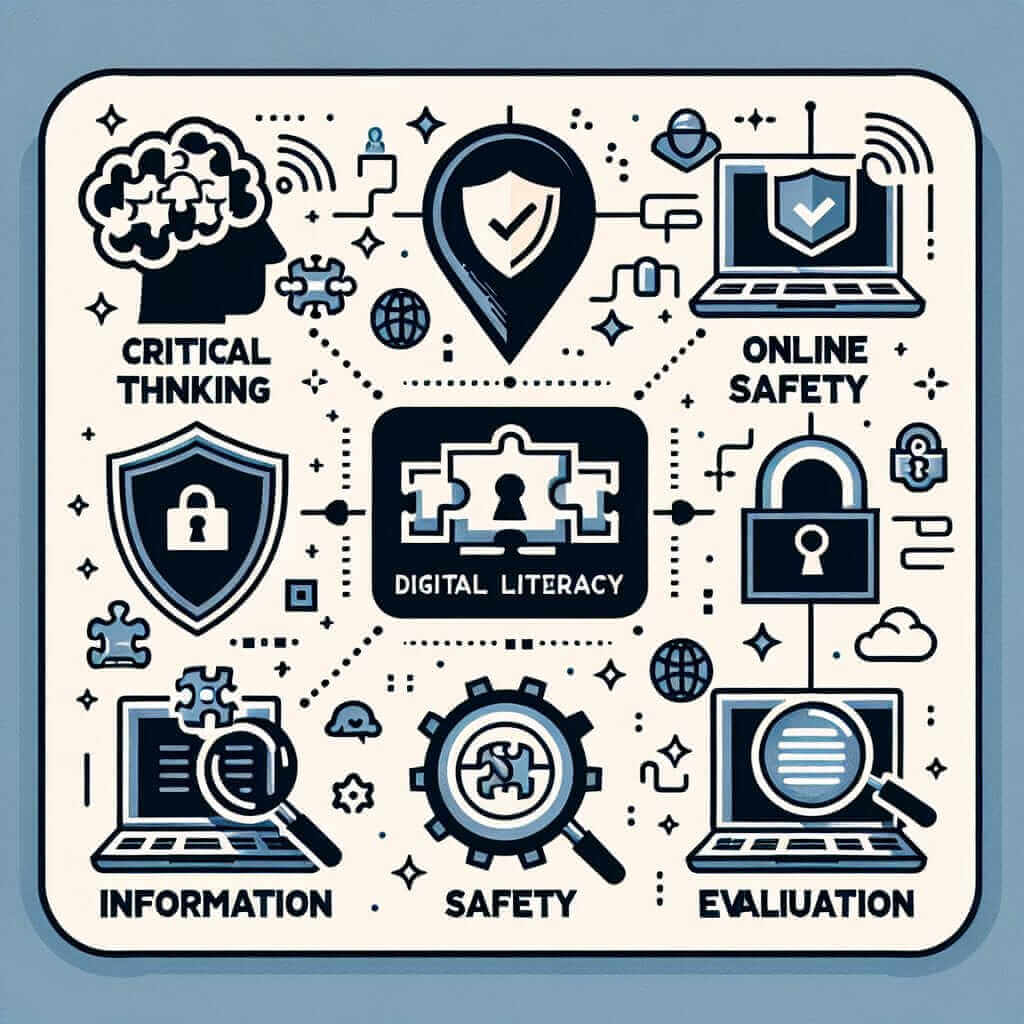The importance of digital literacy in combating misinformation has become highly relevant in contemporary society. With the flux of information available on the internet, distinguishing between credible sources and falsehoods has become increasingly challenging. This topic is highly pertinent to the IELTS Writing Task 2, given its real-world applicability and the rising concerns about misinformation.
Considering historical IELTS Writing Task 2 topics, themes around technology, media, and information credibility have frequently emerged. For instance, past topics have included the impact of social media on society and the role of technology in education. These common themes suggest that “The role of digital literacy in combating misinformation” is highly likely to appear in future exams.
Sample Task 2 Prompt:
In today’s digital age, misinformation is becoming increasingly prevalent. Discuss the role of digital literacy in combating this issue. Do you think digital literacy is the most effective way to tackle misinformation?
Analysis of the Prompt
Understanding the Requirements
The prompt asks for an evaluation of digital literacy’s role in tackling misinformation and whether it is the most effective method for this purpose. To structure a high-scoring essay:
- Introduction: Paraphrase the topic and state your stance.
- Body Paragraph 1: Discuss the role of digital literacy.
- Body Paragraph 2: Evaluate other methods for combating misinformation.
- Conclusion: Summarize the main points and restate your opinion.
Key Points for Analysis
- Define digital literacy and its components.
- Explore how digital literacy helps individuals identify credible sources.
- Consider other methods such as regulatory actions, fact-checking services, and public awareness campaigns.
- Conclude with your assessment of digital literacy’s effectiveness relative to other methods.
Sample Essay
In today’s digital age, the spread of misinformation has become a significant challenge. With the vast amount of information available online, it is increasingly difficult to distinguish between accurate information and falsehoods. This essay will discuss the role of digital literacy in addressing this issue and evaluate whether it is the most effective strategy to combat misinformation.
Firstly, digital literacy is essential in equipping individuals with the skills necessary to navigate the digital landscape critically. Digital literacy includes the ability to identify reliable sources, understand digital content, and recognize biases. For instance, educational programs focused on teaching students how to evaluate the reliability of online sources can significantly reduce the spread of misinformation. By enhancing digital literacy, people can become more adept at discerning the credibility of the content they encounter, thereby mitigating the effects of false information.

However, while digital literacy is crucial, it is not the sole solution to combating misinformation. Other strategies, such as regulatory actions and the work of fact-checking organizations, play complementary roles. Governments and organizations can impose stricter regulations on social media platforms to monitor and remove false content more effectively. Additionally, various fact-checking services have been established to verify the authenticity of information circulating online. Public awareness campaigns also contribute by educating society about the dangers of misinformation and encouraging critical thinking.
Despite the contributions of these methods, digital literacy remains the cornerstone of combating misinformation. Without a fundamental understanding of how to critically analyze digital content, individuals are more susceptible to believing and spreading false information. In contrast, even with stringent regulations and fact-checking services, the sheer volume of content on the internet makes it impossible to filter out all falsehoods without the public’s active participation.
In conclusion, while there are multiple approaches to combat misinformation, digital literacy is arguably the most effective. By empowering individuals with the ability to critically engage with digital content, society can collectively reduce the influence of misinformation. Therefore, prioritizing digital literacy education is vital for a well-informed and responsible digital society. (318 words)
Notes on Writing
-
Vocabulary and Grammar:
- Use specific terminology related to digital literacy and misinformation.
- Employ complex sentences and a range of grammatical structures to demonstrate proficiency.
-
Vocabulary to Remember:
- Navigate (v) /ˈnævɪɡeɪt/: to find one’s way in a particular field.
- Discern (v) /dɪˈsɜːrn/: to recognize or identify as separate and distinct.
- Mitigate (v) /ˈmɪtɪɡeɪt/: to make less severe or painful.
- Stringent (adj) /ˈstrɪndʒənt/: marked by rigor, strictness, or severity especially with regard to rule or standard.
- Authenticity (n) /ˌɔːθenˈtɪsɪti/: the quality of being genuine or true.
Conclusion
In summary, digital literacy plays an indispensable role in combating misinformation, making it a critical skill for contemporary society. While other methods like regulatory actions and fact-checking services are important, fostering digital literacy should be at the forefront of efforts to tackle the spread of false information. Future IELTS essays may focus on similar themes such as the impact of technology on society or the role of education in fostering critical thinking.
Practice topics:
- Discuss the impact of social media on information dissemination.
- Evaluate the effectiveness of government regulations in censoring fake news on the internet.
- How can public awareness campaigns contribute to reducing the spread of misinformation?